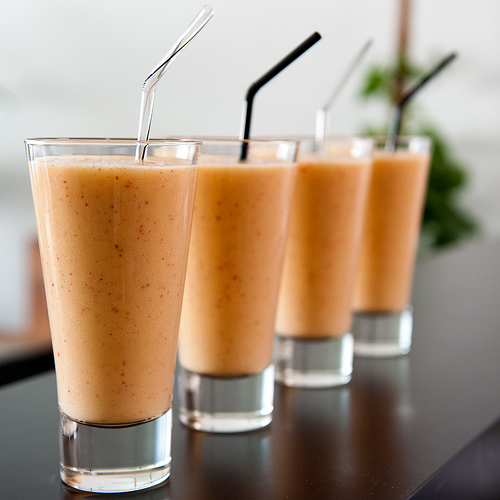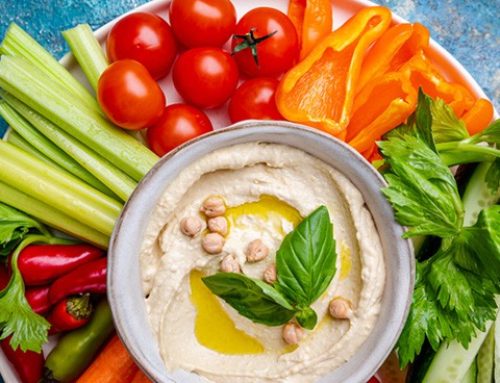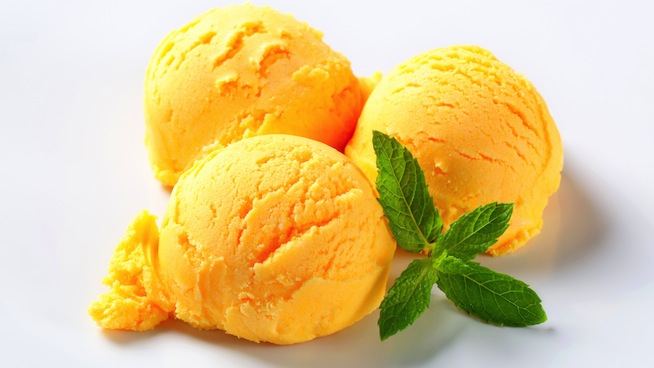3 Smoothie Recipes to Meet Your Nutrition Needs

A smoothie is like your dietary sixth man. The blended beverage won’t get the bulk of your caloric “minutes,” since most of your daily intake comes from regular meals. But when you need help with a goal–like bouncing back from a tough workout, adding extra muscle, or just getting high-quality nutrition when you’re in a hurry–smoothies are ready to step on the court and shoot the lights out. Here are three ways smoothies can support your efforts to be a better athlete, along with sample recipes to get you started.
They Power Up Your Post-Workout Recovery
Studies have shown that taking in a combination of protein and carbs after a workout can help speed up muscle recovery. The carbohydrates replenish depleted glycogen stores (your main source of energy during a workout), while protein lowers your body’s levels of cortisol (a muscle-catabolizing hormone) and boosts muscle-building protein synthesis. I recommend post-workout drinks with a 2:1 ratio of carbohydrates to protein—which means if your mix has 10 grams of protein, it should contain 20 grams of carbohydrates. (Learn more about post-workout nutrition.)
Good, nutrient-dense carbohydrate sources for a recovery smoothie include fresh fruits, fruit juice (look for brands labeled “100 percent juice”), and oats. Some fruits, like pineapples and tart cherries, have anti-inflammatory properties that can lend additional support to muscle recovery. For protein sources, try milk, yogurt (Greek or regular) or protein powder.
Pineapple Cherry Recovery
- 2 Scoops Vanilla EAS Lean 15 Protein Powder
- 1/4 cup Fage Plain fat-free Greek yogurt
- 1/2 cup frozen cherries
- 1/2 cup frozen pineapple
- Water and ice cubes as needed
Calories: 280
Carbs: 51g
Protein: 21g
Fat: 1.5g
Fiber: 8g
They Help You Get Bigger, Faster
If you need to pack on pounds for next season, smoothies can help you reach your goal. A smoothie supplies extra calories, and saves you from having to spend time cooking (and chewing) yet another chicken sandwich. Mix in calorie-dense ingredients like peanut or almond butter if your goal is to add on a lot of mass in a hurry.
“Pack it On” Chocolate Almond
- 12 oz 1% chocolate milk
- 1 scoop EAS chocolate Recovery Protein
- 2 Tbsp almond butter
- 1 cup ice
Calories: 570
Carbs: 67g
Protein: 28g
Fat: 21g
Fiber: 5g
*You can up the calorie count by another 200 calories by adding a large banana and increasing the chocolate milk portion to 16 ounces.
They Make Mighty Meals On-the-Go
Busy athletes don’t always have time to sit down and eat. When you need a quick meal replacement or fast breakfast before practice, a smoothie can come to the rescue. Add fresh fruit like blueberries to your mix for carbs that will help fuel your brain for the day and provide compounds that have anti-inflammatory properties. For a protein that can help tummy health, try Kefir, a yogurt-like beverage stacked with probiotics that support your gastrointestinal system.
Blueberry Bliss
- 8 oz Nancy’s Blueberry Kefir
- 1 scoop EAS vanilla Lean 15
- 1/2 cup frozen blueberries
- 1 cup ice (optional)
Calories: 300
Carbs: 53.5g
Protein: 16.5g
Fat: 3.25g
Fiber: 6.5g
Learn more about Athletes’ Performance and the professional and elite athletes they support on the Athletes’ Performance page on STACK.
RECOMMENDED FOR YOU
MOST POPULAR
3 Smoothie Recipes to Meet Your Nutrition Needs

A smoothie is like your dietary sixth man. The blended beverage won’t get the bulk of your caloric “minutes,” since most of your daily intake comes from regular meals. But when you need help with a goal–like bouncing back from a tough workout, adding extra muscle, or just getting high-quality nutrition when you’re in a hurry–smoothies are ready to step on the court and shoot the lights out. Here are three ways smoothies can support your efforts to be a better athlete, along with sample recipes to get you started.
They Power Up Your Post-Workout Recovery
Studies have shown that taking in a combination of protein and carbs after a workout can help speed up muscle recovery. The carbohydrates replenish depleted glycogen stores (your main source of energy during a workout), while protein lowers your body’s levels of cortisol (a muscle-catabolizing hormone) and boosts muscle-building protein synthesis. I recommend post-workout drinks with a 2:1 ratio of carbohydrates to protein—which means if your mix has 10 grams of protein, it should contain 20 grams of carbohydrates. (Learn more about post-workout nutrition.)
Good, nutrient-dense carbohydrate sources for a recovery smoothie include fresh fruits, fruit juice (look for brands labeled “100 percent juice”), and oats. Some fruits, like pineapples and tart cherries, have anti-inflammatory properties that can lend additional support to muscle recovery. For protein sources, try milk, yogurt (Greek or regular) or protein powder.
Pineapple Cherry Recovery
- 2 Scoops Vanilla EAS Lean 15 Protein Powder
- 1/4 cup Fage Plain fat-free Greek yogurt
- 1/2 cup frozen cherries
- 1/2 cup frozen pineapple
- Water and ice cubes as needed
Calories: 280
Carbs: 51g
Protein: 21g
Fat: 1.5g
Fiber: 8g
They Help You Get Bigger, Faster
If you need to pack on pounds for next season, smoothies can help you reach your goal. A smoothie supplies extra calories, and saves you from having to spend time cooking (and chewing) yet another chicken sandwich. Mix in calorie-dense ingredients like peanut or almond butter if your goal is to add on a lot of mass in a hurry.
“Pack it On” Chocolate Almond
- 12 oz 1% chocolate milk
- 1 scoop EAS chocolate Recovery Protein
- 2 Tbsp almond butter
- 1 cup ice
Calories: 570
Carbs: 67g
Protein: 28g
Fat: 21g
Fiber: 5g
*You can up the calorie count by another 200 calories by adding a large banana and increasing the chocolate milk portion to 16 ounces.
They Make Mighty Meals On-the-Go
Busy athletes don’t always have time to sit down and eat. When you need a quick meal replacement or fast breakfast before practice, a smoothie can come to the rescue. Add fresh fruit like blueberries to your mix for carbs that will help fuel your brain for the day and provide compounds that have anti-inflammatory properties. For a protein that can help tummy health, try Kefir, a yogurt-like beverage stacked with probiotics that support your gastrointestinal system.
Blueberry Bliss
- 8 oz Nancy’s Blueberry Kefir
- 1 scoop EAS vanilla Lean 15
- 1/2 cup frozen blueberries
- 1 cup ice (optional)
Calories: 300
Carbs: 53.5g
Protein: 16.5g
Fat: 3.25g
Fiber: 6.5g
Learn more about Athletes’ Performance and the professional and elite athletes they support on the Athletes’ Performance page on STACK.











